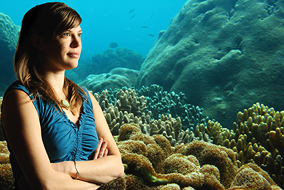
Jennifer Selgrath learned her own resilience after a serious accident last year - photo by Martin Dee UBC Reports | Vol. 55 | No. 3 | Mar.
5, 2009
Fulbright Profile:
What Makes Oceans, and Researchers, Resilient?
By Brian Lin
Jennifer Selgrath’s quest to study and restore the resilience of ocean habitats in the Philippines took a detour last year when she and her bike were struck by a car and thrown into oncoming traffic.
On the road to recovery, however, she learned her own strength and resilience – and found a renewed passion for research.
Growing up in Southern California on the beach where Baywatch was filmed, the PhD candidate with the UBC Fisheries Centre’s Project Seahorse dreamed of becoming a dancer. But her dreams expanded – she is still a dance artist – when she traveled to Southeast Asia as an undergrad and realized that answers to the most severe environmental problems weren’t as straightforward as she’d thought.
“In my Los Angeles-based worldview, sustainability was a goal that seemed achievable by moderately shifting my lifestyle,” says Selgrath. “It was through my interactions with the local communities that I understood why people sacrifice long-term sustainability for short-sighted gains, especially when basic survival is on the line.”
The experience was “uncomfortable but inspiring,” according to Selgrath, who began devoting her energy to environmental education, policy and research – and eventually landing at UBC.
“Project Seahorse is highly unusual in a university setting, because we advance marine conservation by blending academic rigour with applied management and policy work,” says Selgrath. The groundbreaking project, headed by Prof. Amanda Vincent, works with partner organizations around the world to conduct marine biology research and apply the findings immediately to improve the lives of communities that rely on fisheries resources, while helping conserve and rehabilitate ocean environments at the same time.
As part of her PhD work, Selgrath examines viable strategies for rehabilitating coastal ecosystems in the Philippines, which are among the most diverse marine environments in the world. Decades of exploitative fisheries practices, including blast-fishing and trawling, have left the area severely damaged and the local fishers’ livelihoods in peril.
“The area is experiencing very different pressures from what most people here in Canada are familiar with when it comes to fisheries conservation,” says Selgrath. “Fishers there largely draw on the marine resources for food and to supply tropical aquarium and traditional Chinese medicine trades.
“While the methods and scale of the fishing practices are different, the consequences of and damage to the marine environment are similar to that of large-scale fishing fleets – destroying marine habitats such as coral reefs and seagrass, and reducing biodiversity.”
The good news, says Selgrath, is that her research is indicating that damaged marine habitats could bounce back. “What I’m attempting to find out is what contributes to this resilience,” she explains.
“Protecting habitats is the most effective way to conserve biodiversity. But do we protect habitats that are most robust and therefore have a better chance of rebounding, or do we protect habitats that are more sensitive so they don’t get to the point of being beyond recovery?”
To understand the intricate factors affecting the marine ecosystem, Selgrath is turning to both new technology and good old-fashioned footwork. She has convinced Planet Action, a French satellite imaging company, to donate decades of satellite images of the region – worth approximately $150,000 – so she can analyze and identify areas most threatened by habitat degradation.
Starting this fall, she’ll use her Fulbright Scholarship to visit the Philippines and interview fishers in these communities to learn where they fish, what practices they’ve used historically and what methods they now use to adapt to the decline in fish abundance.
“I’ll then tie the fishing pressure and coral survival data together to evaluate how habitats respond to human activities, and suggest what the communities can do to conserve the longevity of their livelihood while continuing to prosper in the meantime,” says Selgrath, who’ll collaborate with colleagues from the Philippines-based Project Seahorse Foundation.
“The toughest part of any conservation effort is convincing people to change their behaviour,” she acknowledges. “As a marine biologist, my job is to provide communities that rely on the ocean for survival with information that they can use to determine their own approach to long term sustainability.”
From the brink of death and after months of rehabilitation, Selgrath has chosen research as her lifelong career.
“I wouldn’t have done any of the things I did before the accident – teaching, dancing and research – if I didn’t love them,” says Selgrath, who could barely follow one train of thought at a time following the injuries suffered in the accident. “But out of everything I love, research affords me the opportunity to transform the future of the ocean and to sustain the wellbeing of the people who rely on it. It gives me the tools to make a real difference in the world.” |
